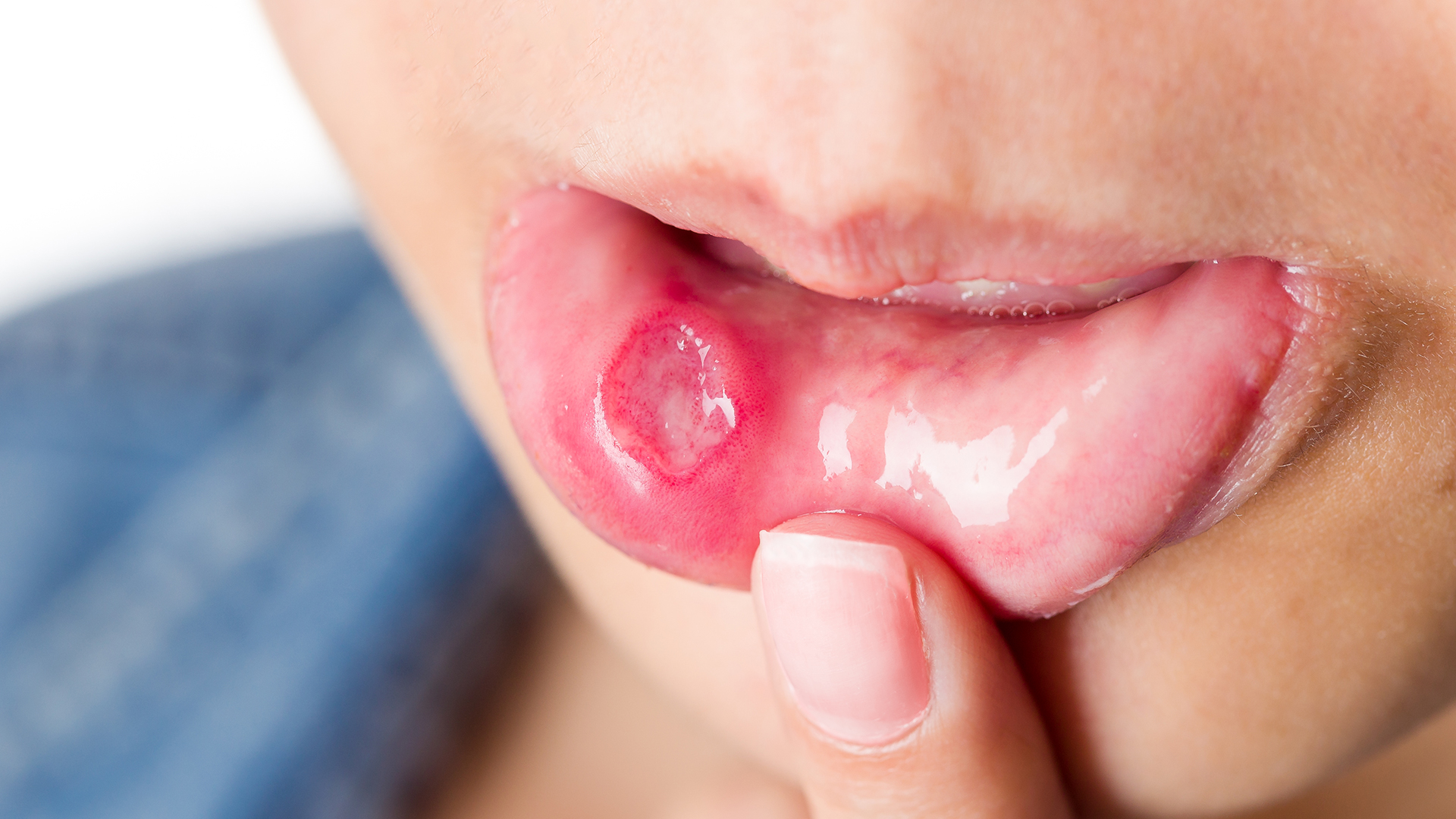
Mouth ulcers
What are mouth ulcers?
Causes of mouth ulcers
Mouth ulcer symptoms
Mouth ulcer treatment
The relationship between mouth ulcers and oral cancer
Conclusion
Sources
Mouth ulcers
I woke up early in the morning, but unlike usual, I felt severe pain on the inside of my mouth. When I explored the area with my tongue, I discovered a painful spot that felt like a hole. The pain intensified upon touching it. Looking in the mirror, I saw an ulcer that made it difficult to eat, drink, and speak. The discomfort persisted throughout the day, and as the pain from the mouth ulcer increased, I realized I needed to visit the dentist for an examination and treatment. What are mouth ulcers, what causes them, and how can they be treated? Read on to learn more.
What are mouth ulcers?
A mouth ulcer is a very small, crater-shaped sore that develops on the tongue, inside the lip, or the cheek. These ulcers have a red border with a white or yellow center. They are painful and can make it difficult to speak and eat. You may experience one or multiple ulcers at a time.
Mouth ulcers are not contagious and cannot be transmitted to other people.
Anyone can develop mouth ulcers, but they are more common in women, teenagers, and young adults. Most people will experience mouth ulcers at some point, and some may get them regularly.
These ulcers are often harmless and typically disappear on their own within 10 to 14 days without needing treatment. However, they can recur multiple times without a known cause, affecting about 20 percent of the population.
If your mouth ulcer does not heal after 14 days, or if you frequently have them, it is advisable to see your dentist.
Causes of mouth ulcers
The exact causes of mouth ulcers are not known with certainty, but it is thought that they may be the result of several factors, such as:
- Oral trauma, such as biting the tongue or lips.
- Viral or bacterial infections.
- Hormonal changes, especially in women.
- Stress and anxiety.
- – Nutritional deficiencies, such as iron deficiency, vitamin B12, or folic acid.
- Food allergy.
- Allergic reaction to some bacteria.
- Reaction to some medications.
- As a result of gastrointestinal diseases such as Crohn’s disease or celiac disease.
- Wear braces or dental retainers.
- Use rough or abrasive toothpaste.
- Eat plenty of acidic foods, such as oranges, pineapples, and strawberries.
Mouth ulcer symptoms
Symptoms can vary depending on the size and location of the ulcer, but the most common symptoms include:
- Pain in the affected area.
- Sensitivity to heat or cold.
- Ulcer pain gets worse when eating spicy, salty, or sour foods.
- Difficulty speaking, eating, or drinking.
- Inflammation and redness of the affected area.
- Burning or itching sensation
Mouth ulcers may last for about a week. Small sores heal in about two weeks, but larger sores may take longer to heal. Some people develop another mouth ulcer after the first one heals. Most mouth ulcers heal without leaving scars.
Mouth ulcer treatment
In most cases, you may not need to see a doctor for mouth ulcers as they usually improve on their own. However, you can try several home remedies to relieve the pain caused by canker sores:
- **Eat Soft, Bland Foods:** Choose easy-to-swallow foods like yogurt or cream soup. Avoid hot beverages, spicy or salty foods, citrus fruits or juices, nuts, seeds, and tomatoes.
- **Drink Cold Liquids:** Drink cold liquids, such as water or iced tea, using straws to avoid contact with the canker sore.
- **Apply Antiseptic Gel:** Apply an antiseptic gel directly to the ulcer to promote healing and reduce pain.
- **Brush Teeth Carefully:** Brush your teeth gently, avoiding contact between the toothbrush bristles and the sore.
- **Salt Water Rinse:** Dissolve 1 teaspoon (5 ml) of salt in 1 cup (240 ml) of water and rinse your mouth with the solution.
- **Hydrogen Peroxide Rinse:** Mix equal parts hydrogen peroxide and water and rinse your mouth with the mixture twice daily.
- **Take Pain Relievers:** Use over-the-counter pain relievers, such as non-steroidal anti-inflammatory drugs (NSAIDs), to manage discomfort.
If your mouth ulcers do not improve after trying these home remedies for a few weeks, you should see a dentist.
The Relationship Between Mouth Ulcers and Oral Cancer
Persistent mouth ulcers can be a sign of oral cancer. In most cases, mouth cancer presents as ulcers on or under the tongue. These cancer-related ulcers are typically distinct and long-lasting, without an obvious cause, such as a sharp tooth. If an ulcer lasts more than three weeks, it should be examined by a dentist. While these ulcers usually appear on the tongue, they can also occur elsewhere in the mouth. Oral cancer is strongly associated with smoking and excessive alcohol consumption, with the combined use significantly increasing the risk.
Conclusion
Mouth ulcers are common and often result from various causes. They are generally minor injuries that heal easily. The risk of mouth ulcers can be reduced by maintaining good oral hygiene, using a high-quality toothbrush, and eating a diet rich in vitamins A, C, and E, including fresh fruits and vegetables. These practices can also help reduce the risk of developing mouth cancer.
See also: What is dental calculus cleaning?
Follow us on Instagram The Gentle Dentist
Sources
- https://my.clevelandclinic.org/health/diseases/21766-mouth-ulcer
- https://www.nhs.uk/conditions/mou th-ulcers/
- https://www.betterhealth.vic.gov.au/health/conditionsandtreatments/mouth-ulcers#causes-of-mouth-ulcers
- https://www.healthline.com/health/mouth-ulcers#symptoms
- Myth or Fact? Everything You Need to Know About Teeth Whitening at Home
- Dental Implants: The Perfect Solution for Tooth Loss and Restoring Self-Confidence
- Secrets of a Healthy Mouth: Daily Habits That Protect Your Teeth from Cavities
- Thumb sucking in children and its effect on dental health.
- Benefits of regular teeth cleaning

